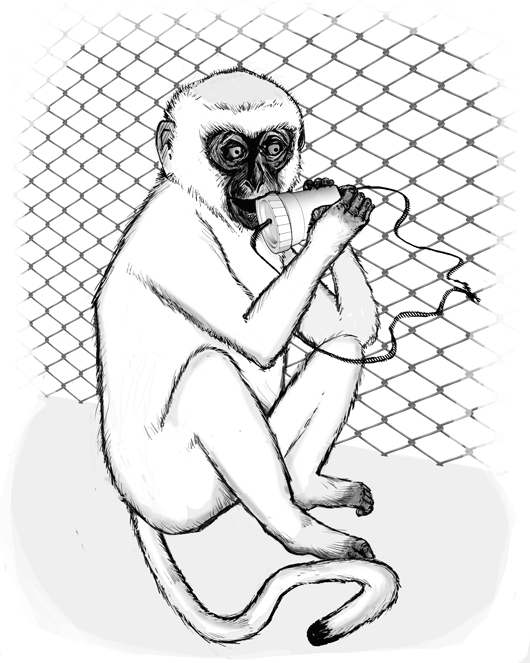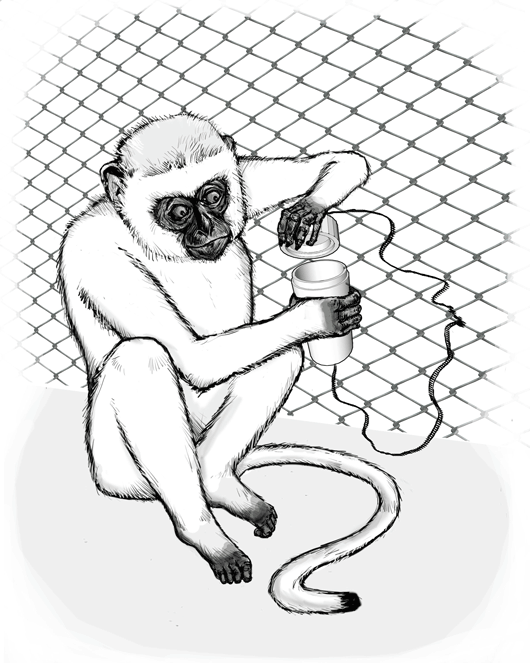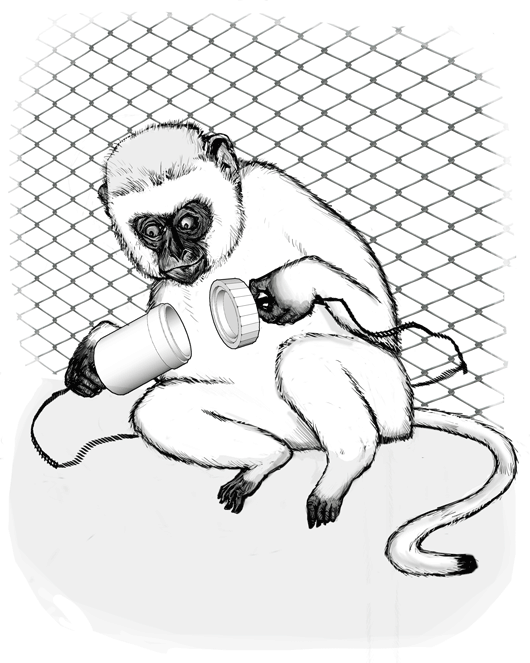Monkey see, monkey do
The long-held belief that learning through imitation is restricted to humans has been cast in doubt by researchers at the University of St Andrews.
The new study, by Professor Andrew Whiten and Dr Erica van de Waal, shows that vervet monkeys learn by copying others in their group, as human children do.
The research found that monkeys were able to discover new techniques for obtaining food by mimicking the behaviour of others within their group. Not only that, but the same techniques then spread to other group members in the same way.
In four different groups, three different techniques spread, supporting the theory that these methods were passed on rather than learned individually.
The researchers believe vervet monkeys, like human children, are shaped by copying others and in this way come to be members of their cultural group.
Professor Whiten, Wardlaw Professor in the School of Psychology and Neuroscience, commented, “Our research is revealing that primates other than humans share some of our own reliance on doing as others do in our group.”
During the study, Professor Whiten and Dr van de Waal, both members of the Scottish Primate Research Group, studied four groups of monkeys who were living in sanctuaries in South Africa where their behaviour could be closely monitored.
Each group was offered an “artificial fruit” with a lid which could be popped-off to reveal a treat inside. These were named “aethipops” after the species’ scientific name, Chlorocebus aethiops.
The researchers found that the most common way monkeys found to open an aethipop was to hold it in one hand and use their mouth to pull the top off.

Drawing: Jason Zampol.
However, in one group an adult female, named ‘Finger’, held the aethipop in one hand and then used her other hand to pop the top off.
The researchers subsequently found that Finger’s more unusual technique spread preferentially to members of her group.

Drawing: Jason Zampol.
They then observed a juvenile in another group, ‘Mike’, discovering a third opening technique – by pulling the ropes attached to the two parts of the aethipop, so it popped open like a Christmas cracker. Soon after this discovery an adult male used the same technique, which then spread to the rest of Mike’s group.

Drawing: Jason Zampol.
Research Fellow Dr van de Waal explained, “These results reinforce some of our earlier findings that for these monkeys, adults are the typically preferred models to learn from.”
Researchers believe the discovery that the “mouth” and “hand” techniques spread in their respective groups is important scientifically because it demonstrates bodily imitation – an ability that has been in doubt for non-human species, despite the old adage “monkey see, monkey do”.
This discovery, that the three different techniques emerged and spread preferentially in their respective groups, suggests that the monkeys’ social learning abilities could provide a basis for simple cultural inheritance in these animals.
“Now the challenge is to extend these studies to wild vervet monkeys, and with major Swiss funding, I’m glad to say that project is already well underway,” said Professor Whiten.
The study is part of a major international collaboration, the ‘Inkawu Vervet Project’ with Swiss researchers at the Universities of Neuchâtel and Zurich, funded by the Swiss National Science Foundation, and is published by PLOS ONE.
Note to Editors
For images (colour photograph, line drawings) please contact the press office.
The article is available at: www.plosone.org/article/info%3Adoi%2F10.1371%2Fjournal.pone.0047008.
Professor Andrew Whiten is available on 44 1334 462073 / 0781 7368637 or by emailing: [email protected].
Dr van de Waal is available on 44 1334 463048 / 0742 3161871 [after 12 Oct – 41 7982 06627] or by emailing: [email protected].
Issued by the Press Office, University of St Andrews
Contact Fiona MacLeod on 01334 462108 / 0771 414 0559.
Ref: (monkey 11/10/12)
View the University’s latest news at www.st-andrews.ac.uk/news
Category University news